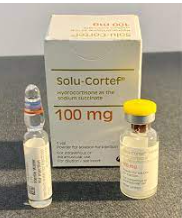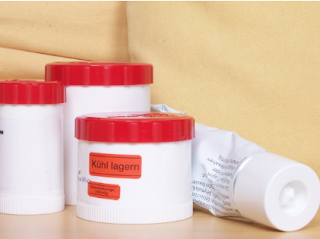Hydrocortisone:
Introduction to Hydrocortisone
Hydrocortisone is a corticosteroid medication widely used in medicine for its anti-inflammatory and immunosuppressive properties. Understanding its uses and considerations is essential for safe and effective treatment.
Mechanism of Action
Hydrocortisone works by suppressing the body's immune response and reducing inflammation. It acts by inhibiting the production of inflammatory mediators and modifying the body's immune response to various stimuli.
Indications for Use
Hydrocortisone is indicated for the treatment of a variety of medical conditions, including allergic reactions, asthma, rheumatic disorders, and skin conditions such as eczema and dermatitis. It is also used in hormone replacement therapy for adrenal insufficiency.
Forms and Dosages
Hydrocortisone is available in various forms, including tablets, creams, ointments, and injections. The dosage and form of hydrocortisone prescribed depend on the condition being treated and the patient's individual needs.
Administration and Usage
Hydrocortisone can be administered orally, topically, or intravenously, depending on the condition being treated. It is essential to follow the prescribed dosage and administration instructions to ensure optimal therapeutic effects.
Side Effects and Precautions
Common side effects of hydrocortisone include fluid retention, weight gain, high blood pressure, and mood changes. It is essential to use hydrocortisone cautiously and under medical supervision, especially in high doses or for long periods, to minimize the risk of adverse effects.
Interactions with Other Medications
Hydrocortisone may interact with other medications, including certain antibiotics, antifungal agents, and immunosuppressants. It is essential to inform healthcare providers about all medications being taken to avoid potentially harmful interactions.
Special Considerations
Special consideration should be given to the use of hydrocortisone in specific populations, such as pregnant or breastfeeding women, children, and older adults. Dosage adjustments may be necessary to ensure safe and effective treatment.
Monitoring and Follow-Up
Regular monitoring of patients receiving hydrocortisone therapy is essential to assess treatment response, monitor for adverse effects, and adjust treatment as needed. Follow-up appointments with healthcare providers are essential for ongoing management and evaluation.
Benefits and Risks
While hydrocortisone therapy can provide significant relief for many medical conditions, it is not without risks. Patients and healthcare providers should weigh the potential benefits against the risks when considering hydrocortisone treatment.
Patient Education
Patient education is essential to ensure safe and effective hydrocortisone therapy. Patients should be informed about the purpose of treatment, proper medication administration, potential side effects, and when to seek medical help.
Alternatives and Complementary Therapies
In some cases, alternatives to hydrocortisone therapy may be considered, such as nonsteroidal anti-inflammatory drugs (NSAIDs), immunomodulators, or biologic agents. Complementary therapies, such as acupuncture or dietary changes, may also support hydrocortisone treatment.
Myths and Misconceptions
There are several myths and misconceptions surrounding hydrocortisone, including concerns about addiction and misconceptions about its use in certain medical conditions. It is essential to address these misconceptions to ensure informed decision-making.
Seeking Medical Advice
Patients should consult a healthcare provider before starting or stopping hydrocortisone therapy. It is essential to discuss any concerns or questions about hydrocortisone treatment with a qualified medical professional.
Popular Hydrocortisone Brands
Several hydrocortisone brands dominate the market, including Cortizone-10, Preparation H, and Aveeno. These brands offer a range of products designed to address different skin conditions and symptoms.
Brand Recognition and Reputation
Brand recognition plays a significant role in consumer preferences when choosing hydrocortisone products. Established brands with a long-standing reputation for quality and effectiveness tend to be favored by consumers.
Efficacy and Effectiveness
The efficacy of hydrocortisone brands can vary depending on factors such as formulation, concentration, and application method. Clinical studies and patient feedback provide valuable insights into the effectiveness of different brands.
Formulations and Variants
Hydrocortisone brands offer various formulations, including creams, ointments, gels, and sprays, to suit different preferences and needs. Some brands also offer specialized variants for conditions such as eczema, psoriasis, and allergic reactions.
Price and Affordability
The cost of hydrocortisone products can vary significantly between brands, with some being more affordable than others. Factors such as brand reputation, packaging, and additional ingredients can influence pricing.
Availability and Accessibility
Hydrocortisone brands are widely available over-the-counter in pharmacies, supermarkets, and online retailers. However, accessibility may vary depending on geographical location and distribution channels.
Consumer Preferences
Consumer preferences for hydrocortisone brands are influenced by factors such as brand reputation, product efficacy, packaging, and marketing strategies. Brand loyalty and trust play a significant role in shaping consumer behavior.
Safety and Side Effects
While hydrocortisone is generally considered safe when used as directed, it can cause side effects such as skin irritation, burning, and thinning. Patients should be aware of potential side effects and consult a healthcare professional if any concerns arise.
Physician Recommendations
Healthcare professionals play a vital role in recommending hydrocortisone brands based on patient needs, medical history, and treatment goals. Physicians consider factors such as potency, formulation, and safety when prescribing hydrocortisone.
Brand Loyalty and Trust
Building trust and loyalty among consumers is essential for hydrocortisone brands to maintain a competitive edge in the market. Providing high-quality products, excellent customer service, and accurate information fosters brand loyalty and trust.
Patient Education
Educating patients about hydrocortisone brands is essential for ensuring safe and effective use. Patients should be informed about the benefits, risks, and proper application techniques of hydrocortisone products.
Future Trends
The hydrocortisone market is constantly evolving, with manufacturers introducing new formulations, packaging, and marketing strategies to meet consumer demands. Emerging trends include the development of novel delivery systems and the incorporation of natural ingredients.
Conclusion
Hydrocortisone is a valuable medication used in the treatment of various medical conditions. By understanding its uses, considerations, and potential risks, patients and healthcare providers can make informed decisions about hydrocortisone therapy.
Exploring hydrocortisone brands provides valuable insights into the diverse range of products available to consumers. By understanding the features, efficacy, and safety considerations of different brands, patients can make informed choices that best suit their needs.
FAQs
1. Can hydrocortisone be used to treat skin conditions?
- Yes, hydrocortisone is commonly used to treat skin conditions such as eczema, dermatitis, and psoriasis.
2. Is hydrocortisone safe for long-term use?
- Long-term use of hydrocortisone may be associated with an increased risk of side effects. It is essential to use hydrocortisone cautiously and under medical supervision.
3. Can hydrocortisone be used during pregnancy?
- Hydrocortisone may be used during pregnancy under the supervision of a healthcare provider. However, the dosage and duration of treatment should be carefully monitored.
4. What should I do if I miss a dose of hydrocortisone?
- If you miss a dose of hydrocortisone, take it as soon as you remember. However, if it is almost time for your next dose, skip the missed dose and continue with your regular dosing schedule.
5. Are there any dietary restrictions while taking hydrocortisone?
- There are no specific dietary restrictions while taking hydrocortisone. However, it is essential to maintain a healthy diet and lifestyle to support overall health and well-being.


